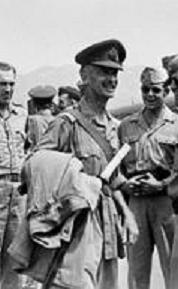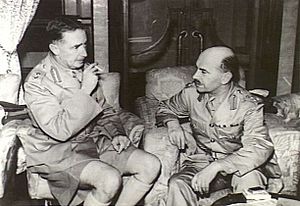Christopher Maltby facts for kids
Quick facts for kids
Christopher Maltby
|
|
|---|---|

Major General Christopher Maltby
|
|
| Born | 13 January 1891 India |
| Died | 6 September 1980 (aged 89) Taunton, England |
| Allegiance | United Kingdom |
| Service/ |
British Indian Army |
| Years of service | 1908–1946 |
| Rank | Major general |
| Service number | 199269 |
| Unit | 9th Jat Regiment |
| Commands held | British Troops in China (1941) 19th Indian Infantry Brigade (1940–41) 3rd Indian Infantry Brigade (1939–40) 3rd Battalion 9th Jat Regiment (1937–39) 4th Battalion 9th Rajput Regiment (1936–37) |
| Battles/wars | First World War Russian Civil War Waziristan campaign Second World War |
| Awards | Companion of the Order of the Bath Military Cross Mentioned in Despatches (4) |
| Relations | Air Vice Marshal Sir Paul Maltby (brother) |
Major General Christopher Michael Maltby (born January 13, 1891 – died September 6, 1980) was an important officer in the British Indian Army. He was in charge of British soldiers in Hong Kong in 1941. This was just before Japan invaded Hong Kong during World War II. After the invasion, he became a prisoner of war.
Contents
Early Life and Army Start
Christopher Maltby went to Bedford School when he was younger. Later, he studied at the Royal Military Academy, Woolwich. In 1910, he joined the Indian Army as an officer. He became part of the 9th Jat Regiment. Before World War I, he served in the Persian Gulf area.
Serving in World War I
Maltby fought in the First World War. He spent most of his time on the Western Front in Europe. During this war, he was injured. He also received the Military Cross award for his bravery. He was mentioned in official reports three times for his good work.
Between the World Wars
After World War I ended, Maltby continued his military training. In 1923, he went to the Staff College in Quetta, India. He served in the North West Frontier region of India. In 1925, he became a general staff officer at the Army Headquarters in India.
He went to another Staff College in Andover, England, in 1927. By 1930, he was a Deputy Assistant Adjutant General in India. He returned to the North West Frontier in 1937. In 1938, he taught at the Staff College in Quetta. Then, in 1939, he became a general staff officer in Baluchistan District.
World War II and Hong Kong
When Second World War began, Maltby took on several important roles. He commanded the 3rd Jhelum Brigade. Then he led the Calcutta Brigade. Finally, he commanded the 19th Indian Infantry Brigade in India.

In August 1941, he was made Commander of British Troops in China. He arrived in Hong Kong on July 19, 1941. He quickly saw that there was much work to do to prepare for war. He wanted to improve the city's defenses.
Maltby was very impressed by the Hong Kong engineers. He suggested creating a new local army unit. This unit would be called the 'Chinese infantry battalion'. The War Office approved his idea. This led to the creation of the Hong Kong Chinese Regiment. It was the first local Hong Kong infantry unit in the British Army.
Battle of Hong Kong
Maltby set up a defense line called the Gin Drinkers Line. This line was about 10 miles long on the mainland part of Hong Kong. However, his troops were quickly forced to move back to Hong Kong Island.
General Takashi Sakai of Japan began attacking Hong Kong Island. British troops tried to fight back on December 19, 1941. But on December 25, 1941, Maltby surrendered to the Japanese at Queen's Pier. He was a prisoner of war from 1941 until 1945.
Life After the War
After the war, Christopher Maltby retired from the army on June 10, 1946. He was given the special title of honorary major-general. In 1953, he became a Deputy lieutenant of Somerset, England. He spent the rest of his life there.
 | Isaac Myers |
 | D. Hamilton Jackson |
 | A. Philip Randolph |

